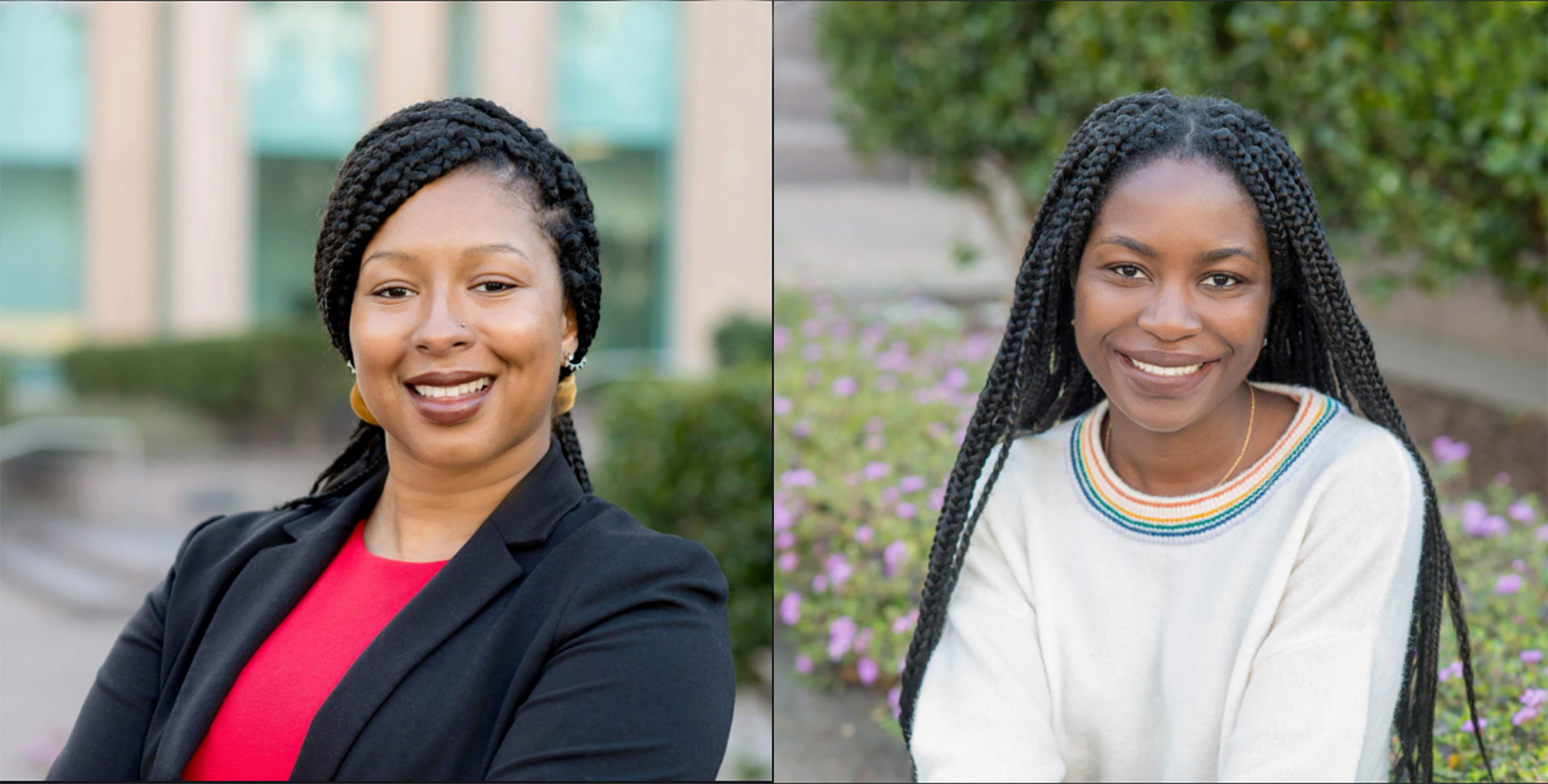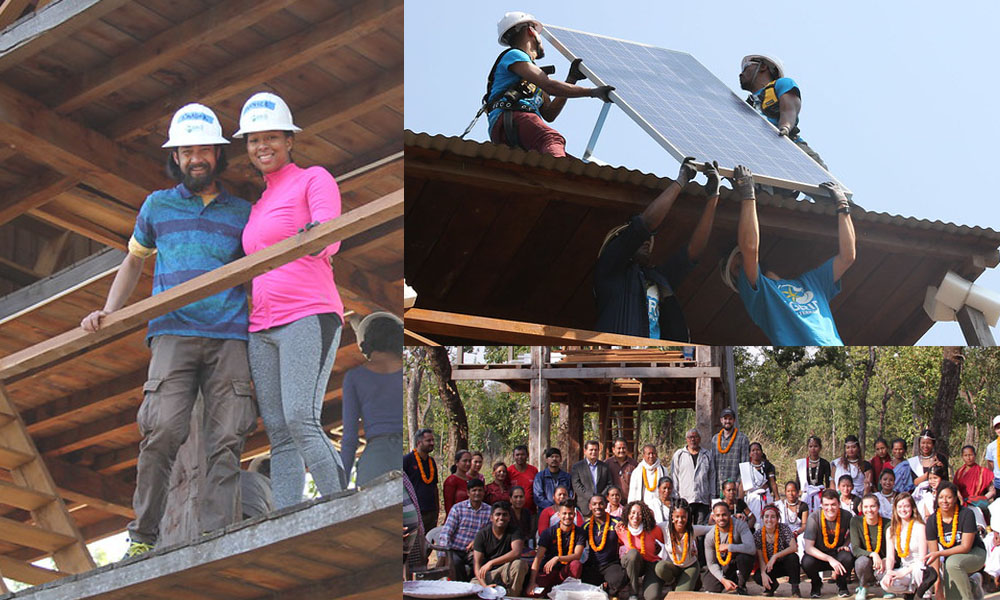
Making it Their Business
Two Black women from the Class of 2020 forge science, style, and sustainability in a new twist on a cultural tradition
By Denise Spranger
It was not the dream of Jannice Newson (MS ’20) to enter the business world. In fact, the Conservation Ecology student had her mind upon the biocontrol of the coffee berry borer in Puerto Rico—research upon which she based her master's thesis at SEAS.
But through an unexpected moment of shared inspiration, Newson is now co-founder of Lillian Augusta, a company that is developing a plant-based, 100 percent biodegradable braided hair product for Black women. And if the start-up’s success in receiving $100,000 in funding is any indication, it’s an idea whose time has come.
Newson now has the time—and resources—to pursue that idea. Both she and her business partner were named Entrepreneurs in Residence at the climate-focused NGO, Carbon180, where the fellowship will pay their salaries for a year as they continue research and development on their Lillian Augusta line.
Newson, a native of Chicago, first met her business partner, Nana Britwum (MS ’20), at a conference in Seattle. At the time, Britwum was a fellow U-M master’s student pursuing a degree in molecular, cellular, and developmental biology. When they returned to Ann Arbor, the two women struck up a friendship—and also struck upon an idea.
...after that conversation, we said, ‘Hey, why not solve the problem?'"
“One night when we went out,” Newson recalls, “I had just braided my hair, and Nana and I were complaining about braids that make your scalp itch and your skin break out. But then we started to think past our own personal discomfort. Synthetic braiding hair is manufactured from plastic fibers—resulting in plastic pollution with every hairstyle. To make matters worse, most of the plastics in use are carcinogenic. So, there are health implications involved as well. And after that conversation, we said, ‘Hey, why not solve the problem?’”
Confident that they could develop a more comfortable, non-toxic, and environmentally conscious alternative, Newson and Britwum began to seek funding. The first sizable grant came from Building Opportunities for Original and Sustainable Thinking (BOOST), an initiative of the Delta Institute in Chicago. With that money, they were able to buy the supplies needed to develop a prototype using Phragmites, an invasive plant species, for the base material.
We were working in a fiber studio on North Campus. We made one prototype, and then COVID-19 closed the university.”
The grad students went on to win multiple competitions at the U-M Ross School of Business, including Dare to Dream and the 2020 Michigan Business Challenge. Those awards were followed by another from the Greenhouse Initiative at Sambazon. Most recently, they received $25,000 in funding from the Desai Accelerator.
Such early success in funding was very encouraging, but Newson admits that the logistics of product development has not been without its challenges.
“We were working in a fiber studio on North Campus,” relates Newson. “We made one prototype, and then COVID-19 closed the university.”
The two scientist entrepreneurs remained undaunted, and painstakingly hauled their equipment and supplies down to their basement to continue the work. After experimenting with different plant fibers, they created their second prototype—which they feel is superior to the first.
As the founders of Lillian Augusta no longer have access to university labs and engineering partners, they are working with natural fiber manufacturers to transition their prototype into a product that can be shared with potential customers. By the numbers, the customer base looks highly promising.
Hair in the Black community is a labor of love, a form of expression, and a connection to our ancestry."
Black hair care products, Newson explains, are a 2.5 billion-dollar industry—and that doesn’t include hair extensions, braids, and other styles. The more comprehensive number, she says, would be much higher.
But as in any business, the challenge lies in how to motivate consumers to purchase a newly released alternative. To spark interest in that future release, Lillian Augusta defines the company—and its philosophy—on its new website.
“Hair in the Black community is a labor of love, a form of expression, and a connection to our ancestry. Black women have set the tone for fashion and beauty by utilizing synthetic braiding hair to create unique hairstyles. For Black women, beauty comes at a price. This poor quality, synthetic braiding hair causes immense discomfort and contributes to plastic pollution in the environment. What’s our solution? Plant-based braiding hair that eliminates the discomfort associated with synthetic braiding hair and is 100% biodegradable. Lillian Augusta revolutionizes Black hair care by offering hair without harm™.”
Adding to the product's appeal may be the founders themselves. While Black women scientists involved in sustainable fields are not an anomaly, people of color are still discouragingly underrepresented. Initiatives such as the Doris Duke Conservation Scholars Program (DDCSP) are designed to change that demographic—by bringing undergraduate students from diverse backgrounds to universities nationwide. Over the course of two summers, scholars remain in residence at their host university to engage in experiential learning, mentored research, and internships. Dr. Dorceta Taylor, adjunct professor and former Director of Diversity, Equity, and Inclusion, spearheaded the program at SEAS in 2016 and served as the program director.
This is the brilliance of our students that we should celebrate." - Dr. Dorceta Taylor
Newson initially arrived at SEAS as a member of that first DDCSP cohort at U-M. The experience inspired her to return to U-M to pursue her master’s degree in 2018—after earning a bachelor’s degree in soil, atmospheric, and environmental science at the University of Missouri-Columbia. Newson relates that her business partner is also a DDCSP alumna—a bond that the two women share—noting that Britwum’s cohort was based at her own alma mater, Cornell University.
In May 2020, Dr. Taylor shared the news of Lillian Augusta’s successful founding with colleagues, writing, “This is the brilliance of our students that we should celebrate."
Newson’s SEAS experience
When asked about her SEAS experience as a grad student, Newson’s smile broadens. “There were so many things that I never expected to be able to do,” she says, and eagerly recalls a few highlights.
Nepal: As a member of the campus chapter of the national nonprofit, GRID Alternatives, Newson relates, she was among 11 U-M students who traveled to Nepal as part of GRID’s first International Solar Spring Break. The U-M team worked alongside GRID staff and a Nepali solar company to complete the installation—which brought solar power to the Kumal Tower in Nepal’s Chitwan National Park. With access to clean, reliable electricity, the Tower now serves as an ecotourism stay for visitors, creates employment opportunities, and generates income to bolster conservation efforts and livelihoods in the local community. Newson notes that SEAS Assistant Professor and Director of the Energy Justice Lab, Dr. Tony Reames, worked with the “solar panel team” prior to their travel abroad.

Puerto Rico: That same year, Newson spent the entire summer in Utuado, Puerto Rico, performing research for her master’s thesis, “Conservation biocontrol of the coffee berry borer in coffee farms through ant predation.” Her advisors, professors Ivette Perfecto (SEAS) and John Vandermeer (LSA, Ecology and Evolutionary Biology) have ongoing research in the region.
Washington, D.C.: Another highlight for Newson was attending the Citizens’ Climate Lobby, where she was able to speak with representatives.
“I met Congresswoman Debbie Dingell, “says Newson, “and we got to talk about climate change—like actually doing something about it. That was really an exhilarating experience.”
The journey of Lillian Augusta
Newson reflects upon the unforeseen path her career has taken.
“I never intended to start a business,” says Newson. “In fact, I had never even thought about ‘business.’ But this is something that I’ve become passionate about, not only because it impacts my life, but also because I personally look forward to wearing the sustainable and comfortable product that we’re creating—and providing that option for other Black women.
“It has been an exciting journey,” she adds with a smile. “I'm learning so much every day, and it’s like every day is a surprise. We don’t know who we’re going to meet next or what’s going to happen next.”
And just who is Lillian Augusta?
“We named the company after my late grandmother,” says Newson. “Lillian Augusta Lucas was a fearless woman. She left the South as a young woman during the Great Migration, and made the journey to Chicago to start a new life for herself. Her story reminds us of all the bold, amazing women in our lives.”
As she honors her grandmother’s journey, Newson, as another “bold, amazing woman,” fearlessly embarks upon her own.
Read the Oct. 18, 2020, story, "Hair without harm: 2 UM graduates use invasive plant species to create healthier extensions," published in Crain's Detroit Business.

